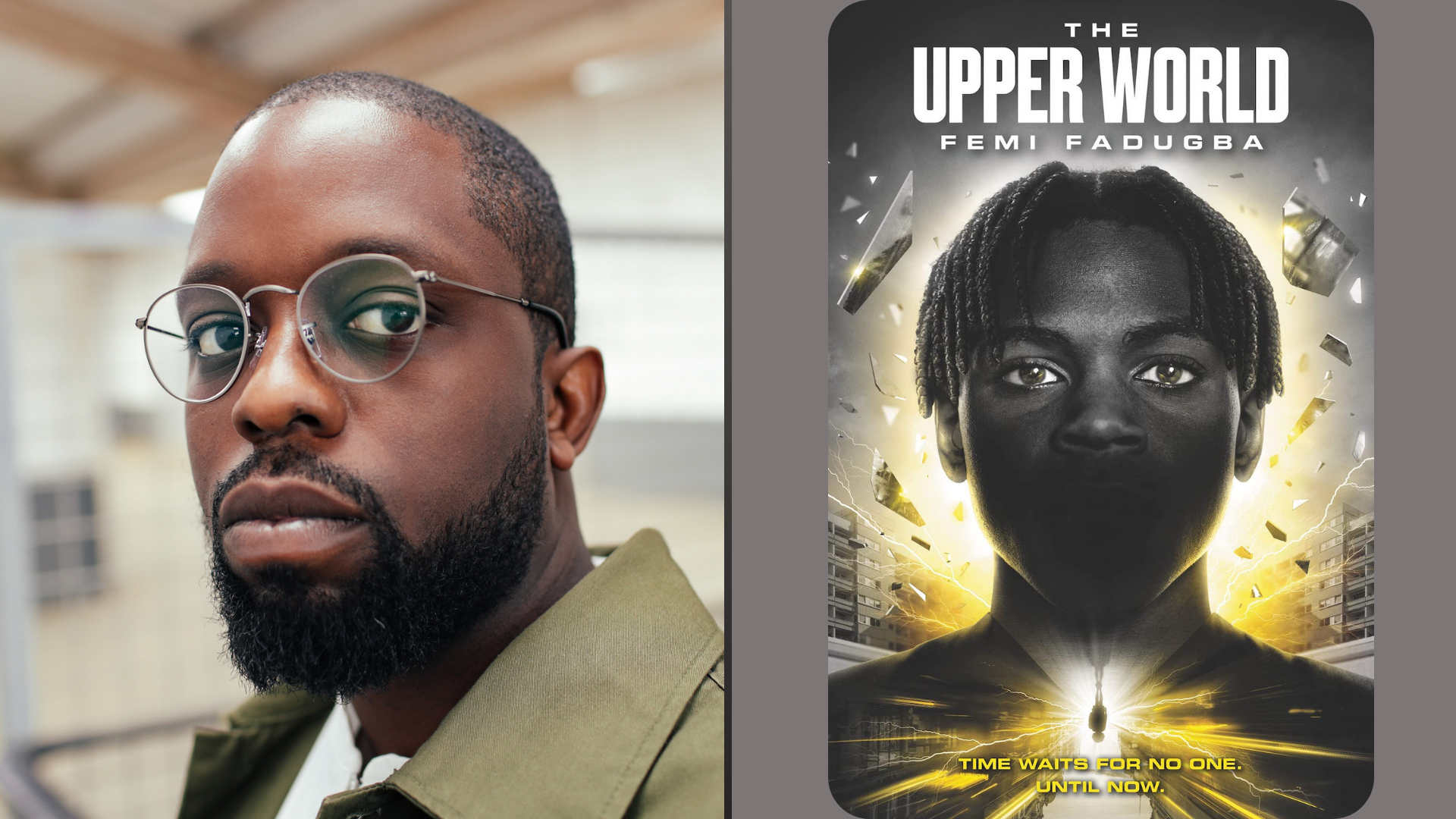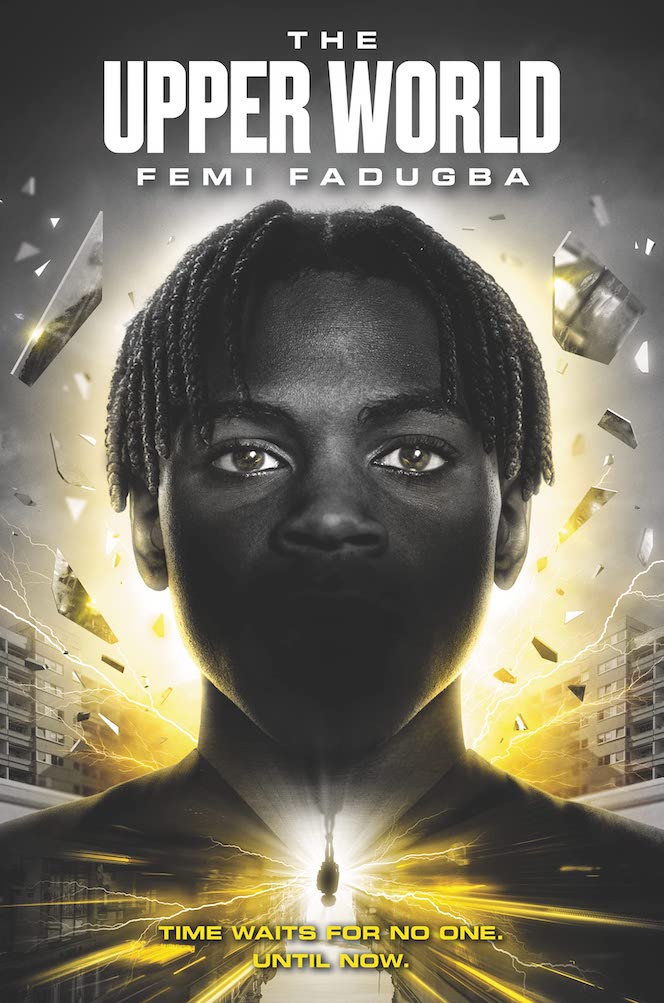
There’s a new sci-fi book series that’s taking the young adult genre by storm—the first book, The Upper World, written by Femi Fadugba has already caught the eye of studio executives, and “Netflix has acquired the film rights…[and] Queen & Slim’s Daniel Kaluuya [is] attached to produce and star.”
Fadugba’s debut novel was also recently “shortlisted for the Waterstones Children’s Book Prize…in the Older Readers category” in addition to being “longlisted for the 2022 Branford Boase Award which is given annually to the author of an outstanding debut novel for children.”
One review attributed the novel’s “unusual credibility” to the fact that Fadugba is a real-life physicist and “has based his ideas about time travel on real science, including Einstein’s theories…(even if you don’t grasp it at all).” Fadugba wrote the novel after many conversations about with people who would ask him to explain quantum physics. “They’d always be super fascinated and wanted me to recommend a book, but I couldn’t find one that I could put my hand on my heart and say: ‘You’ll dig this,’” he told The Guardian.
Fadugba, 35, who splits time between the UK and the US, sat down with ESSENCE to discuss his inspiration for writing the book, his career path and meteoric rise to fame, as well as his upcoming projects.
This interview has been edited for length and clarity.
ESSENCE: What inspired you to write The Upper World?
It’s a complicated one because it has a few different angles. I went to university, and I ended up doing quantum physics, quantum computing, specifically and I thought I was going to be an academic physicist at that point. I published an article at PRL, which is the same publication that Einstein published a lot of his stuff in, so that was kind of like the peak of my career. I was looking for what’s next, but the academic route just felt a little bit abstract.
As a Black African boy in the UK, there are lot more serious problems faced by people than partial differential equations. So, I decided, let me go into working world and see what impact I can have, and I went into business, I did solar energy. But it just wasn’t quite cutting it. I felt like I hadn’t found my voice and didn’t have a platform. I started digging into things that excited me when I was younger, and I rediscovered my love for physics, and especially about time travel. In many ways the genesis of the book was after reading pretty much 100 books on relativity to thinking, how do I explain this in a way that 16-year-old me would have not only understood it, but also have a reason to give a s–t.
That’s why I ended up putting it into a narrative, because people like stories, that’s how we learn things. Look at the book of Genesis, that’s a story about nature. It’s a story about physics in many ways and how the universe came to be, it told a story because that’s how we absorb things, and I think the other side of my motivation was because of the actual story part, the specific characters I chose, the location, the theme I explored. Again, I think for me it was about writing the kind of book that teenage me would have f–ked with basically. A big part of that was, I don’t want to lecture the kids. How do I meet young Black boys where they’re at and then give them a story that combines philosophy, physics, real-life s–t and elevate the conversation and never at any point underestimate their curiosity?
ESSENCE: How many drafts were there? How long, and what was the process like?
I would say that there’s only four words that matter in your first draft: good enough and the end. When I started writing, I assumed that the world consisted of people were born good writers and people who were essentially not so good, and I thought I was in the second category. I had this moment, and I think it was partly from speaking with a couple of people who said, ‘Oh, no everybody starts off rubbish, and then you practice and then you end up good.’ So I accepted that I was a rubbish writer and as long as I made improvement every day and I came to the page every day, I was gonna get a little bit better every day. It actually kind of worked, I mean, if you see the difference between different drafts, you’d be amazed honestly. It came along, and I think there was something about that sort of amateur mindset where I was a nobody. I didn’t have the weight of being a somebody, with the expectations of being a “good writer.” I was in a writing group with a bunch of people who were much better writers than me, and I found that most of them struggled to write a lot because they get to the end of just a couple of sentences or a chapter, or a paragraph and they will decide that it’s not good enough, there was that perfectionist kind of thing that made them just keep revising the first paragraph. Whereas I knew that my paragraphs were rubbish, so I just finished the draft and then went back and started again.
It took two and a half years from first words to pressing send to publishers. I think that’s probably another thing that I did right in the first the first go-round when I was writing the first book, because I didn’t have too much of an ego back then, so I just told people, ‘Hey, I’m not a writer, just read this. What do you think?’ I gave it to a lot of people, my wife read pretty much all eight drafts, whatever I produced. I probably sent it to like 10 other people, just friends, and I think the key thing for me was basically making it safe for them to tell me that my baby was ugly. Instead of just saying ‘What do you think,’ which they probably would have said ‘It’s great,’ I asked, “Did you care about the character? At what page were you hooked? What questions do you have in your mind? Does it make sense?’ Just basically digging for a no, rather than digging for a yes.

ESSENCE: The Upper World is being adapted by Netflix—how did that happen?
This all happened during June of 2020. The book went out to publishers, and out of nowhere, there’s like essentially a bidding war, which was f–king mental to be honest. I’m just doing all these Zoom calls, with different publishers, and then maybe two weeks later the book leaked to Hollywood, I don’t even know what that means. It leaked to a bunch of film studios, both in the UK and the US. And so, literally two, three weeks after the publishing thing closed, I was having calls with a bunch of the big studios and production houses. Then, Netflix came along, Daniel Kaluuya’s agent got a hold of the script and then he read it—I think pretty much in a day—and he said ‘Yeah, I’m keen to be involved.’ It’s so sick, it just came together perfectly to be honest.
ESSENCE: You mentioned that you hoped for this book to be something that your teenage self would have wanted to read. Are there any other things that you hope the legacy of your book to be?
I’m writing the sequel right now, literally just before I hopped on the call, burning through it. I had so many ideas, but I was surprised by how different my headspace was writing the second one versus the first one. I want the book to be a two-part book—a duology. I think one of my inspirations is The Godfather: Part II. It’s a prequel sequel, and we essentially take the events in book one and then we go back in time, and we look at where Esso comes from, which takes us back to Africa, to Benin specifically, and we look at the mythology and the history of that country, and how it interweaves with the upper world. We also go forward, and we pick up from where we left off Rhia. Esso left off in the 2030s where Rhia is now going to uni and is facing a whole new host of challenges, both personally and with upper world and a maniac on the loose, who’s trying to kill her and has ambitions on conquering the multiverses himself.
I mean, I think it’s part of a bigger story. I’m really excited for you to have a look at the second book once it’s out and see, and we can have a discussion then on how it compares. My background, my life has been kind of strewn all over the place, and I’ve seen a lot of different environments. One big contrast that I had growing up was going back and forth between Oxford and Peckham and then my parents were in Rwanda. One of the big things is showing people different worlds, just letting people imagine beyond what they see. There’s a practical aspect of that, which is literally showing different environments. In book two, you’ll definitely get that, in terms of going back to Africa and Rhia going to Cambridge. I think the other aspect of the legacy I hope for by the time I’ve wrapped up, is that people who are religious will see just how similar they are to people who are atheists and scientists, and people who are just interested in how the world works, and what storytelling and metaphors mean and have a unified vision. I know that’s a very abstract way to describe it. In book one, you saw a glimpse, where I combined physics with a concrete story in Peckham, and in book two I want to take it a bit further and incorporate Africa and religion into that.
I think for me, the biggest joy of writing is just the opportunity it gives me to like find my own joy, and also just share that with other people.





